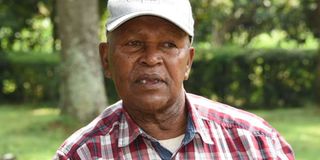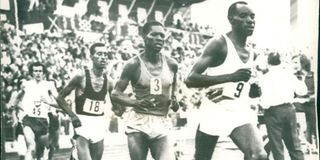Kipchoge Keino: How Ben Jipcho and I plotted Mexico triumph

Legendary athlete Kipchoge Keino, during an interview at his Kazi Mingi farm in Eldoret, Uasin Gishu County on July 25, 2020. PHOTO | JARED NYATAYA | NATION MEDIA GROUP
What you need to know:
- Keino, the first Kenyan runner to venture into professional athletics, was Kenya’s captain to the Mexico Games, and went for, perhaps, too ambitious a target of winning medals in the 10,000, 5,000 and 1,500 metres races
- As the sports world mourns the passing of a legend, his team-mate at the 1968 Games, Hezekiah Kipchoge Keino is shattered, recalls teamwork with Jipcho
- Keino made the move at the bell, and opened up a huge gap with Ryun unsuccessfully giving chase, the effects of high altitude certainly taking toll on the man that would later become a US Congressman
Kenya’s 1968 Olympic 1,500 metres silver medallist Ben Jipcho died on Friday morning. And as his family, Kenyans and the global track and field fraternity and sorority mourn the passing of a legend, his team-mate at the 1968 Games, Hezekiah Kipchoge Keino, is shattered man.
He has lost more than a friend.
He has lost the man who helped him win his first Olympic gold medal — at the 1968 Mexico City Games.
Keino, the first Kenyan runner to venture into professional athletics, was Kenya’s captain to the Mexico Games, and went for, perhaps, too ambitious a target of winning medals in the 10,000, 5,000 and 1,500 metres races.

Kipchoge Keino (second right) with coach Feisal Sherman (right), fellow athletes Ben Jipcho (left) and Naftali Temu (second left) among others in their running days. PHOTO | FILE | NATION MEDIA GROUP
Ambitious because at Mexico’s high altitude, that was unthinkable!
And the fears were somewhat proved legitimate when Keino collapsed in the 10,000 metres final at the Estadio Olimpico Universatario on October 13, with three laps to go as compatriot Naftali Temu won Kenya’s first Olympic gold in 29 minutes, 27.4 seconds. Ethiopia’s Mamo Wolde (29:28.0) and Tunisia’s Mohamed Gamoudi (29:34.2) took silver and bronze.
Four days later, on October 17, Kipchoge recovered to bag silver in the 5,000m (14:05.2) behind Gammoudi (14:05.0) with Temu taking bronze (14:06.4).
The altitude of Mexico City had certainly taken its toll on the indefatigable Keino going into the October 20 final of the 1,500m.
Furthermore, he was suffering gallstones and doctors told him another race would kill him.
“But I wasn’t settled. What would I tell Mzee Jomo Kenyatta if I returned home as team captain without a gold medal,” Keino told Nation Sport in an interview at his Kazi Mingi Farm in Eldoret on Saturday. He defied medics and hopped onto a Games bus to the stadium, and when they got caught up in traffic, he hopped off and ran to the stadium, just making it for the pre-race formalities.
“I told Jipcho ‘I have already run to the stadium and I’m tired… when the race starts, you just go for it’ because we must win,” Keino told us on Saturday as he mourned his friend.

Ben Jipcho of Kenya (second right) trails compatriot Philip Ndoo during a 3,000m steeplechase race run in Oslo, Norway in this undated photo. Jipcho won the race as Ndoo finished third.
“Competition was stiff and we had trained well at the high altitude in Nyahururu and this helped us during the Games because the white people were also tough,” he added. “I told Jipcho that since the race would be close, he should just go with the leaders — who included world record holder Jim Ryun of USA and his fellow American Marty Liquori who were favourites to bag medals,” narrated Keino.
Indeed, when the race started, Keino ran from behind the leading pack with Jipcho throwing down the gauntlet with a blistering opening lap of 55.98 seconds.
Jipcho, Harold Norpoth (West Germany), Keino and Bodo Tummler (West Germany) were in the early lead group before Jipcho accelerated past 800 metres at 1:55.31. Ryun was lying eighth.
Keino made the move at the bell, and opened up a huge gap with Ryun unsuccessfully giving chase, the effects of high altitude certainly taking toll on the man that would later become a US Congressman.
Eventually, Keino won the race in an Olympic record time of 3:34.91, with Ryun fighting for silver (3:37.89) and Tummler (3:39.08) taking bronze. “After two laps, the leading pack’s pace slowed and since I was always fast, I increased my pace which worked to my advantage because I was leading in the last lap, widening a gap to 30 metres,” Keino narrated on Saturday. “They later reduced the gap to 20 metres and Ryun collapsed upon reaching the finish line due to the high pace,” he said.

Minister for Finance and Planning Mwai Kibaki (right), admires one of the gold medals won by Ben Jipcho. Jipcho won gold medals in 3,000m steeplechase and 5,000 metres as well as bronze in 1,500 metres at the 10th Commonwealth Games held in Christchurch, New Zealand in 1974. PHOTO | FILE | NATION MEDIA GROUP
The 20 metres was the biggest winning margin at the Olympics in a 1,500 metres final. Kipchoge said he also remembers while at the training camp in Nyahururu preparing for the Munich Olympics Games in 1972, two government ministers — Ronald Ngala and Masinde Muliro — visited the athletes and after taking a tour of the camp, Ngala collapsed at the top of the hill due to the high altitude.
“That show we had the best training environment which also helped us bag medals,” he said.
Four years after Mexico, at the Munich Games, Keino told Jipcho that the 3,000m steeplechase race was not his event and encouraged Jipcho to go for gold since he had speed.

Legendary athlete Kipchoge Keino shows a past photograph of him with the first President of Kenya the late Mzee Jomo Kenyatta at State House where he awarded him a gift that resembles a lion, for being the Kenyan Captain that performed well, on arrival from the event. This was during an interview at his Kazi Mingi farm in Eldoret, Uasin Gishu County on July 25, 2020. PHOTO | JARED NYATAYA | NATION MEDIA GROUP
But in the home stretch, Kipchoge was unstoppable, winning gold in an Olympic record time of 8:23.60 with Jipcho left battling it out with Finland’s Tapio Kantanen who finally gave up at the finishing line with Jipcho settling for silver, clocking 8:24.60.
“In the 3,000m steeplechase race, we discussed with Jipcho on how to compete, and our main target was for Jipcho to win the race. But towards the end, I had enough energy and I surged forward winning the race while Jipcho bagged silver medal,” he said.
That’s how close in competition Jipcho and Keino were. They would always sit down and plan their races ahead of competition.

A past photograph of Legendary athlete Kipchoge Keino (right) with the first President of Kenya the late Mzee Jomo Kenyatta at State House where he awarded him a gift that resembled a lion, for being the Kenyan Captain that performed well, on arrival from the event. This was during an interview at his Kazi Mingi farm in Eldoret, Uasin Gishu County on July 25, 2020. PHOTO | JARED NYATAYA | NATION MEDIA GROUP
“We always planned our races and I would tell Jipcho that the last 50 metres could determine the winner in any race that we would feature in,” said Keino who joined the police force in 1957.
Keino met Jipcho when the latter was a student at Maseno Teachers Training College where he used to compete in the 3,000m steeplechase, 5,000m and 10,000m races. It's at Maseno that Jipcho's talent was identified before he later joined the Kenya Prisons Service. “Jipcho gave us hard times during those days, and that is how we became friends and he was later recruited at the Kenya Prisons Service. I knew he was the best man to train with and we became great friends,” he added.
The two were later enrolled as professional athletes and Keino signed a contract of Sh250,000-a-year. A stark contract from local allowances in which they would earn just Sh14 a day while they were at the camp and Sh25 while out of the country.

Legendary athlete Kipchoge Keino, on phone during an interview at his Kazi Mingi farm in Eldoret, Uasin Gishu County on July 25, 2020. PHOTO | JARED NYATAYA | NATION MEDIA GROUP
“I bought this land here (Kazi Mingi Farm, Eldoret) using the money we got from the contract and my friend Jipcho was lucky to be signed in by the Adidas company while I started with Puma to Adidas then later changed to Nike," he recalls.
“We made money those days because we managed to compete across Europe competing in various events,” said the athletics legend.
They would also fight for the rights of athletes.
Keino also had close connections with Mzee Jomo Kenyatta, Kenya’s first President. He was under the General Service Unit who took care of Mzee Kenyatta’s security in Lodwar, Turkana County, and later at Maralal when Kenyatta was transferred in detention.

A past photograph of Legendary athlete Kipchoge Keino (third right), and other athletes being greeted by the first President of Kenya the late Mzee Jomo Kenyatta at State House where he awarded him a gift that resembles a lion, for being the Kenyan Captain that performed well, on arrival from the event. This was during an interview at his Kazi Mingi farm in Eldoret, Uasin Gishu County on July 25, 2020. PHOTO | JARED NYATAYA | NATION MEDIA GROUP
He later accompanied Kenyatta to his Gatundu home where he was in the President’s security team before he was allowed to train full time in 1965. “Kenyatta said that he could not continue holding me and allowed me to move to Kiganjo Police Training College where I went on with my training. We met again several times with Mzee when we used to go to State House to be handed over the national flag before competitions,” he said.
Keino feels there is need for the legends to be honoured and appreciated for the glory they brought into the country.
“Personally, I feel honoured because the stadium in Kapsabet in Nandi County and Kipchoge Keino in Eldoret have been named after me. There is also the Kip Keino Stadium in Bristol, in the United Kingdom and I’m humbled for being recognised,” he said.





